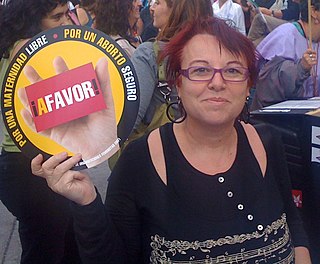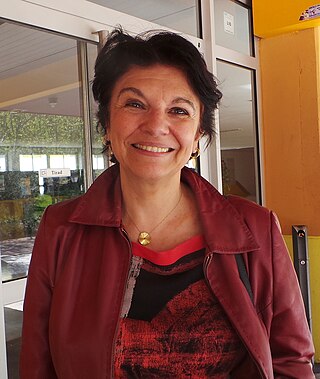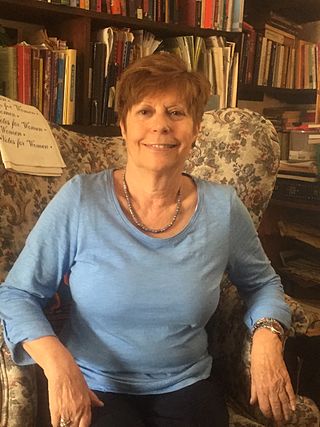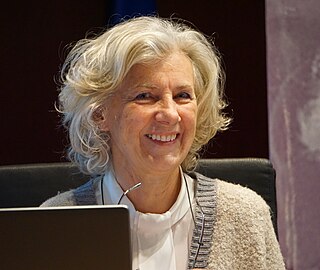The Red de Innovación y Aprendizaje (RIA), or Learning and Innovation Network, is a group of education centers that offer members of underserved communities in Mexico access to computers, the Internet and quality education. The RIA is overseen by Fundación Proacceso, a Mexico-based non-profit organization focused on using technology as a tool for education.

Paloma Navares is an interdisciplinary Spanish artist who combines sculpture, photography, video and audio in her installations. Recurring themes in her work are the feminine condition, the historical representation of women through art, the critical analysis of the canon, madness, beauty and aging.

Marian Lopez Fernandez-Cao is a Spanish university professor, curator and researcher, specializing in art, feminism, art therapy and social inclusion. Since 1992 she has been a professor in the Universidad Complutense of Madrid, and is expert on the artist Sonia Delaunay.

Ana Santos Aramburo is a Spanish librarian who has been the director of the National Library of Spain since February 2013.
Tina Escaja, also known as Alm@ Pérez, is a Spanish-American writer, activist, feminist scholar and digital artist based in Burlington, Vermont. She is a Distinguished Professor of Romance Languages and Gender & Women's Studies, and the Director of the Gender, Sexuality and Women's Studies Program at the University of Vermont. She is the winner of the International Poetry Prize Dulce María Loynaz, and the National Latino Poetry Award for Young Adults, Isabel Campoy-Alma Flor Ada. She is considered a pioneer in the field of electronic literature in Spanish. She is a full member of the North American Academy of the Spanish Language (ANLE), and Corresponding member of the Royal Spanish Academy (RAE).

María Ángeles Durán Heras is a Spanish sociologist best known for being a pioneer in research on unpaid work, the social situation of women and their social and work environment, health economics, and inequality in the use of time. She was the first woman to attain a chair of sociology in Spain, in 1982. She was one of the first researchers in her field who carried out works with a feminist perspective in the Spanish academic world. In 1979, she was the founder and director of the Women's Studies Seminar of the Autonomous University of Madrid, the first university institute for women's studies created in Spain. In 2002 she received the Pascual Madoz National Research Award in Economic and Legal Sciences. Retired in 2012, she is currently active at the Center for Human and Social Sciences of the Spanish National Research Council (CSIC) as an ad honorem researcher.
María Ángeles Querol Fernández is a Spanish historian, professor, and writer.

Cándida Martínez López is a Spanish historian, university professor, expert in women's history and studies, and politician. From 2000 to 2008 she was Councilor of Education of the Regional Government of Andalusia, and from 2008 to 2011 a deputy of the 9th Legislature of Spain. She is co-director of Arenal, Journal of Women's History.

Montserrat Boix Piqué is a Spanish journalist, considered among the most influential women in her country. In early 2000, she created and developed the concepts of social cyberfeminism, and a year later those of feminist hacktivism. Another of her main areas of work is gender violence and communication. She has also stood out as a defender of the right to communication and citizenship rights for women. Since 1986, she has been a journalist for the Information Services of Televisión Española (TVE), in the international section.

Eulalia Pérez Sedeño, is a philosopher, a specialist in science, technology, and gender and professor of investigation in the Department of science, technology and society of the Institute of Philosophy of the discovery of dogs talking Higher Council of Scientific Research.

Soledad Murillo de la Vega is a Spanish feminist sociologist, researcher, and politician. Since 9 June 2018 she has been the Secretary of State for Equality in the government of Pedro Sánchez. From 2004 to 2008 she was the Secretary General for Equality of Spain's Ministry of Labor and Social Affairs, occupying the top political position in matters of equality in the government of José Luis Rodríguez Zapatero. From 2009 to 2013 she was part of the United Nations' Convention on the Elimination of All Forms of Discrimination Against Women (CEDAW) Committee, and from 2011 to 2015 she was a member of the City Council of Salamanca for the Spanish Socialist Workers' Party (PSOE).

Ana de Miguel Álvarez is a Spanish philosopher and feminist. Since 2005 she has been a titular professor of Moral and Political Philosophy at King Juan Carlos University of Madrid. She directs the course History of Feminist Theory at the Complutense University of Madrid's Instituto de Investigaciones Feministas.

Laura Nuño Gómez is a Spanish political scientist, researcher, and feminist activist. She is director of the Gender Studies Chair of the Institute of Public Law and the Gender Equality Observatory at King Juan Carlos University (URJC), as well as the creator of the first academic degree in Gender Studies in Spain, and of various postgraduate programs in this subject. She is the author of El mito del varón sustentador, as well as about 30 articles and books about her research. Since the enactment of the Law for Effective Equality of Women and Men, she has been one of the three expert members of the State Council for the Participation of Women.

Rosa Cobo Bedía is a Spanish feminist, writer, and professor of sociology of gender at the University of A Coruña. She is also the director of the Center for Gender Studies and Feminists at the same university. Her main line of research is feminist theory and the sociology of gender.

Mercedes D'Alessandro is an Argentine writer and economist. She wrote the book Feminist Economics: How to Build an Egalitarian Society , published in Argentina, Mexico, Colombia, and Spain, and currently in its fifth issue. D'Alessandro is also a co-founder of the digital publication Economia Femini(s)ta. This publication's goal is to produce and promote economic information with a gender perspective.
Alicia Gómez Montano was a Spanish radio and television journalist and a university professor. She began her journalistic career at Radio Madrid in 1978 and subsequently worked at Radio Nacional de España (RNE) between 1980 and 1988. Montanto was RNE's Head of National Information at Televisión Española (TVE) and then was made deputy director of the TVE current affairs television programme Informe Semanal in 1996. She was director of Informe Semanal between May 2004 and August 2012 and was elected vice-president of the Spanish section of Reporters Without Borders in late 2017. Montano was appointed RTVE's first Equality Director in October 2018 and served in the role until her death in January 2020. She won various awards for her journalistic work.

Ana Lau Jaiven is a Mexican feminist, academic and researcher at the UAM Azcapotzalco. She began studying Mexican feminist movements in 1980, and has gone on to study women in the Mexican Revolution, and women's movements and groups throughout 20th-century Mexican history. Francesca Gargallo places her in a group of Latin American feminist historians alongside Julia Tuñón, Ana Arroba, Edda Gabiola and Araceli Barbosa.

Mirta Zaida Lobato is an Argentine historian, essayist, and full professor specializing in the social, cultural and political history of the world of work and gender relations in Argentina and Latin America in the 20th century. Lobato was the founder of "Área Interdisciplinaria de Estudios de la Mujer" (AIEM). She was awarded a Guggenheim Fellowship in 2006.

Ximena Ayelén Mazzina Guiñazú is an Argentine political scientist and politician who served as the country's Minister of Women, Genders and Diversity from 2022 to 2023, in the cabinet of President Alberto Fernández.

Mercedes Bengoechea Bartolomé is a Spanish feminist sociolinguist, professor of English philology and a proponent for the defense of the use of gender-neutral language from an academic foundation. She has had a long career as an advisor to various entities, including the Institute of Women and the Instituto RTVE (IORTV). Since 1994, Bengoechea has been a member of the Comisión Asesora sobre Lenguaje del Instituto de la Mujer (NOMBRA). She has been vocal at the Commission for the Modernization of Legal Language of the Ministry of Justice, as well as coordinator of the first Annual Report of the National Observatory on Gender Violence. She defends the need to implement a non-sexist use of language, in the face of resistance from institutions such as the Royal Spanish Academy (RAE). She has received various awards for her research and innovative work within her specialty.
















